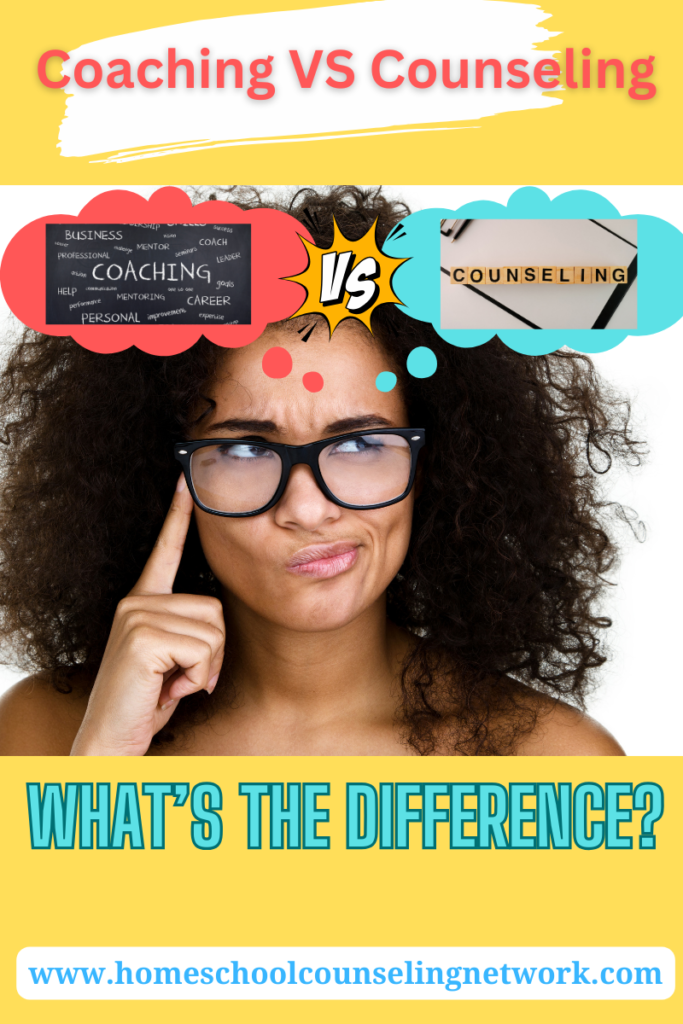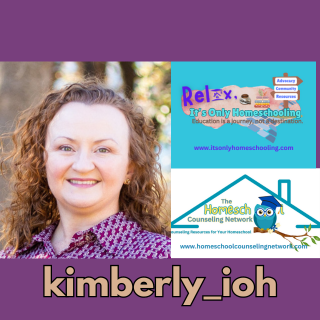Professional Counseling Versus Coaching for Homeschooling Families: What’s the Difference?
**This post contains affiliate links.
In our previous blog posts, we welcomed you to The Homeschool Counseling Network, outlined our mission and vision, highlighted how different mental health providers can support homeschooling families, touted the merits of allied health professionals, and introduced you to Counseling 101.
Today we are going to explore the differences between professional counseling and professional coaching.
While both services are in the vein of helping others, it is important to note distinctions between the two professions.
Licensed Mental Health Professionals
Licensed mental health professionals, such as psychologists, psychiatrists, professional counselors, social workers, and marriage and family therapists, are trained clinicians who can treat mental health disorders. These mental health professionals complete advanced degrees, have additional training and supervision, and are credentialed in the states where they practice.
As part of this licensure and credentialing process, professionals must also adhere to a strict code of ethics and operate within his or her trained scope of practice, as well as complete additional training known as continuing education units to maintain said licenses.
Licensure criteria for each discipline may vary from state to state. Operating without a license is not only unethical but also illegal.
Professional coaches, conversely, cannot treat mental health disorders, are not required to submit to any formal qualifications or academic training, and are not governed by a professional board.

Professional Coaching
While not required to practice, many professional coaches receive some form of training in professional coaching.
If you are seeking coaching services, HCN highly recommends you seek the services of a credentialed coach.
To learn more about the different levels of credentialing, please visit the International Coaching Federation’s (ICF) website. After twenty-five years in the field, the ICF is considered the gold standard in terms of information for professional coaching.
Properly trained coaches, just like properly trained mental health professionals, complete coursework, supervised training hours, evaluations, and exams. Also, professional coaches have different paths and levels of credentialing (i.e., associated certified coach, professional certified coach, and master certified coach, respectively) which are similar to the different levels of licensure for mental health professionals (associates’ level versus fully licensed). Members of the International Coaching Federation (ICF) adhere to a code of ethics and can participate in research, mentoring, networking, and further coaching education.
Furthermore, many licensed mental health professionals employ the use of coaching techniques in their professional practices as a means of helping a stabilized client accomplish a goal.
Finally, many professional coaches have degrees and work experience in other professional backgrounds, such as nursing, health, business, law, nutrition, or education.
Therapy VS Coaching
Professional coaching and professional counseling (or therapy) services can overlap in some cases. While both disciplines work to empower clients to live healthy and fulfilling lives, the objectives and approaches differ.
| Focus | Therapy | Coaching |
| Time Element | Healing from Past or Current Traumas (Deeper Exploration) | Present (Here & Now) |
| Growth | Helping Clients Move Forward (Building Coping Skills, Sharpening Self-Awareness, Improving Relationships, Setting Boundaries, etc.) | Helping Clients Move Forward (Next Steps in Goal Setting) |
| Approach | Multiple: Person-Centered, Gestalt, Psychodynamic, Cognitive-Behavioral Therapy, Humanistic, Systemic, etc.. | Solution-focused (Establishing Short or Long-term Goals and Creating Action Steps) |
| Training | Mental health professionals (therapists, counselors, social workers, etc.) earn degrees, have clinical training, and meet state requirements for licensure. | Professional coaches can earn certifications through accredited programs (but it is not required). |
| Regulations | Mental health professionals are regulated by state licensing boards in their respective disciplines. | No state regulation |
| Reasons Why Clients Would See Provider | Mental health treatment (anxiety, depression, self-esteem, etc), talk therapy (grief & loss, self-harm, suicidal ideation), relationship issues (marriage, parent-child), emotional resolution (past issues), adjusting to major life changes (death, divorce, relocation), stress management, addictive behaviors | Help with goal setting, motivation, career directions/development, spiritual growth, health and wellness, social/communication skills |
While the information in the above chart is by no means comprehensive, it serves as a starting point to illustrate the differences between the two professions.
Want To Know More?
In the upcoming months, HCN is excited to share guest blog posts from professionals in the education, mental health, and professional coaching communities.
In the meantime, here are some suggested articles to further help you determine if your needs would be better met through counseling or coaching services:
Counseling vs. life coaching – Counseling Today
What Is Life Coaching? | Psychology.org
What Your Therapist’s Scope of Practice Means for You (verywellmind.com)
What Is a Life Coach? (verywellmind.com)
Finding the Right Fit
With so many different professionals available to assist you along the way in your homeschooling journey, it can be overwhelming. You may not be sure where to begin.
The Homeschool Counseling Network is unable to vet each professional who joins our network. Instead, we endeavor to provide the homeschooling community with information about the counseling process in general, red flags to look for when considering working with a provider, and how to research a licensed professional in your home state to verify credentials.
This process is commonly referred to as performing due diligence and is the responsibility of the consumer.
As part of our mission to help inspire, inform, and improve lives, we view it as our responsibility to teach families these skills. You can find this information under the Counseling 101 section.
Coming Up
Upcoming blog posts will be filled with all sorts of useful information to guide you in finding the right professional to help meet your academic advising, assessment/testing, counseling/mental health, and tutoring needs. Topics will include Performing Your Due Diligence, Looking Out for Red Flags, and Points To Ponder.
Let’s Keep In Touch
Be sure you do not miss a blog post by signing up for our email list, liking our Facebook, Instagram, Linked In, or Pinterest pages, or subscribing to our YouTube channel.
Like what you see here? Sharing is caring!
Blessings,
Kimberly
IOH Mom
Founder/CEO, It’s Only Homeschooling
Founder/CEO, The Homeschool Counseling Network

This website is not a professional counseling website and nothing here should be construed as professional counseling advice. Although Kimberly Bennett, LPC is a Licensed Professional Counselor, she is not your counselor, and no counselor-client relationship is established unless she has signed an agreement with you. All information provided through this website is for informational and educational purposes only.